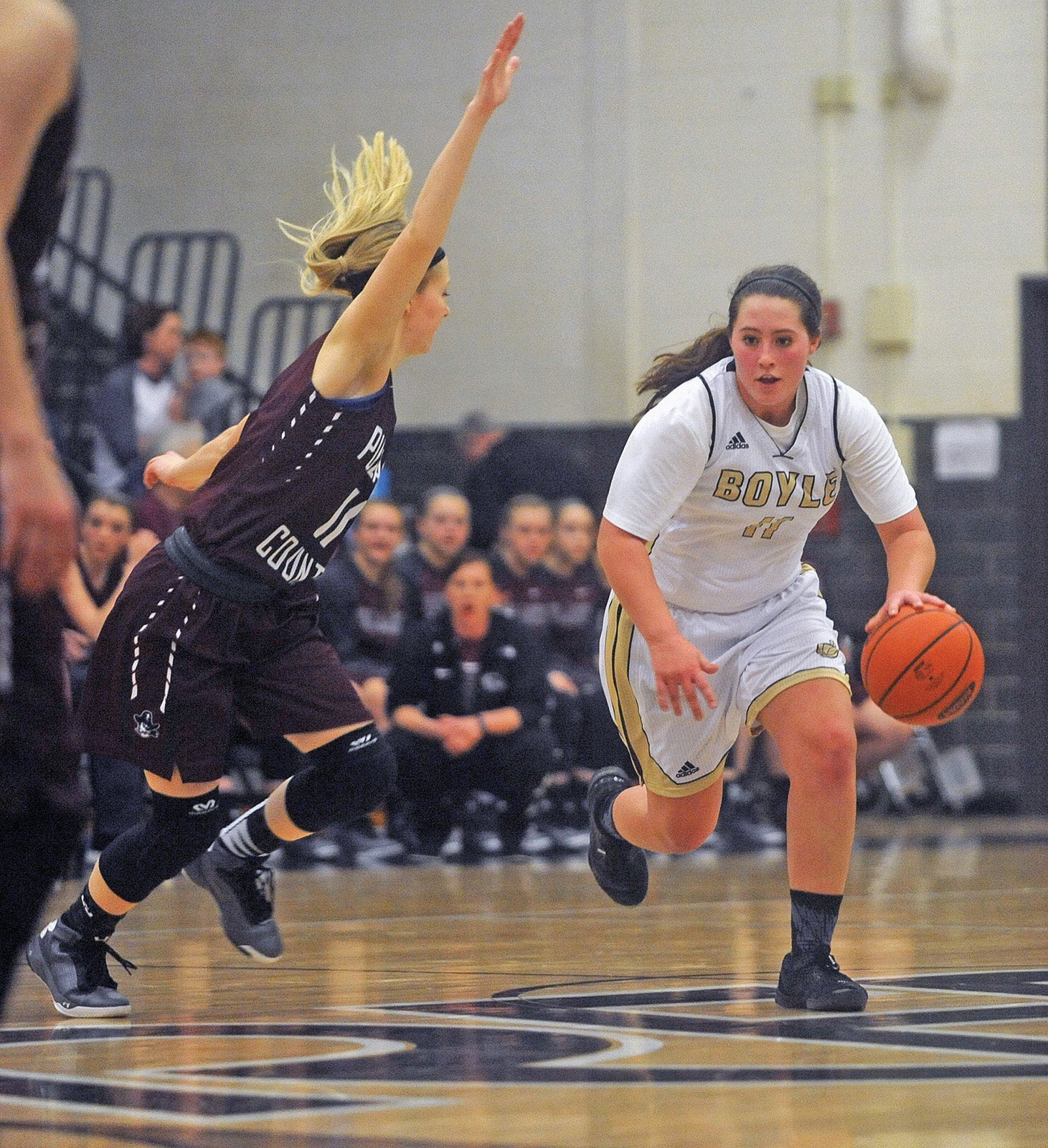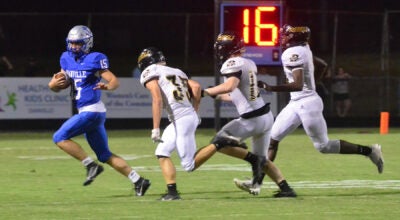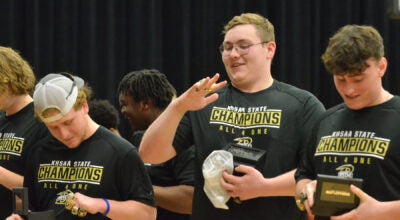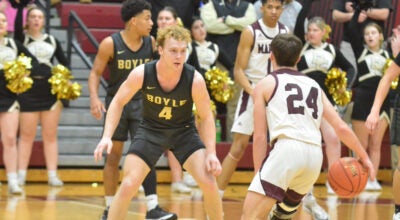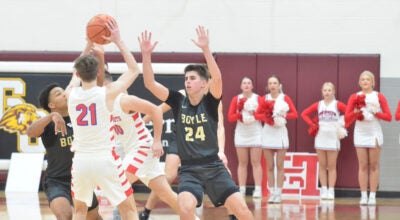Finding a new path: Smith makes decision to stop playing basketball
Published 10:11 pm Friday, December 30, 2016
Marlee Smith’s story took an unexpected turn in her first semester of college.
One of the Danville Advocate-Messenger scholar athletes of the year last year, Marlee was set to play college basketball at Berry College in Georgia.
But as she started playing more and more in the fall, her knee started bothering her. She struggled walking to class. She had to take Advil three times a day just to keep the swelling down.
Then, one practice, there was an all-too-familiar turn of her knee.
“We were doing a turning drill, I was on offense, I wasn’t even on defense,” she said. “I went to cross over the girl that was guarding me, and when I did, my knee just gave out and I just bit it. Right in front of everybody. I was more embarrassed than anything, so I just got up and kept going. Then when I got to the sideline, the girls were saying they heard it pop, you need to get it checked out. I went to the trainer, she said you’re done for the day, it’s super swollen already. So I was thinking, ‘Great. What did I do now?’”
Marlee has a history of injuries to her right knee. Her sophomore year at Boyle County was cut short on the court after tearing her ACL during a basketball tournament over Christmas break.
But this one was different. She was feeling great and in shape after a couple months of conditioning in college.
And it was college. She wanted to make a name for herself — and already was doing just that with coach Stephanie Dunn.
She could continue to play basketball in college, but at a major price.
She went to a doctor in Georgia who took an MRI and said their was a partial tear in that same ACL. But that wasn’t the worst of it: She had also worn down her meniscus to nearly nothing and there was hardly any cartilage left in her knee, causing her bones to grate together. That was causing her to show signs of arthritis at the age of 18.
So, the doctor laid it all out for her: Freshman year, she’d have to take cortisone shots every six to eight weeks. Sophomore year would be worse because the cortisone shots wouldn’t help as much. By junior year, she’d likely need arthroscopic surgery, which would keep her off of the court for part of the season. In her senior year, the doctor said he couldn’t promise she’d be able to run up and down the court.
If she took that route, by her 22nd birthday, she’d need a full knee replacement.
With Marlee interested in a potential career in law enforcement, that was a no-go.
“I called mom when I got out of the doctor’s office, said what was going on,” Marlee said. “She automatically said, ‘I’m not pressuring you, but it’s a no from me.’ She said to call my dad, because he hurt his shoulder in college ball. He had to make the same decision.
“We ended up talking later in the day and he said, ‘I’ll back you up on your decision, whatever you want to do.’ I talked to my coach a little bit, told her that I was on the edge about wanting to play or not. She said she’d respect my decision either way. She was really awesome through it all.”
She tried practicing one more time.
“I prayed about it, and I was just like, it’s not worth it,” Marlee said. “I want to be able to still work out and stuff as I get older. I don’t want to have a knee replacement when I’m 22. I came to (coach) about a week later, I practiced one more time and it was debilitating, unbearable pain.”
Making the decision to leave the sport she loved was a tough one. She had played “since you could put a kid into a recreation league.” She played baseball with the boys until fast pitch, when she moved to softball. Her mother, Lisa Neal-Smith, and father, Jimmy, said that she had more of a “natural talent” in softball.
“But you can’t teach passion,” Lisa said. “And she has a passion for basketball.”
That passion is something that echoes throughout the Smith family.
All in the family
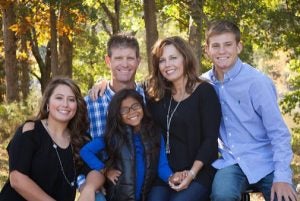
Photo by Christy Cheek/Christy Lee photography
The Smith family, from left: Marlee, Jimmy, Phoebe, Lisa and Reese.
Lisa tells the story of a game of knockout among family members: It was just her and Jimmy left, and their kids picked sides. Reese rooted for Jimmy and Marlee cheered for her mother.
When Jimmy won, Marlee cried.
Jimmy felt bad for winning.
That’s just how competition is in the Smith household. Lisa said she once threw a basketball at Jimmy’s head over a game of H-O-R-S-E. Marlee and her cousin, Colton Elkins (another talented basketball player), always competed with the parents in driveway basketball games.
With the way sports are, that competitive drive is a must for athletes like Marlee, and that’s part of the reason why she excelled in high school.
Making the decision to give up the sport that she loves was even more challenging because of that competitiveness.
“I just know that if I tried to play — and I was tempted — I really wanted to keep playing. But in four years, I think I’d look back and think, ‘wow that was dumb. That wasn’t worth it,’” Marlee said.
The Smiths love their sports. You can spot Jimmy right on the court because he likes to be close to the action. Lisa played softball in the early months of pregnancy with both kids.
But sports aren’t everything, Lisa said.
“I think you get so wrapped up in it,” she said. “Everybody wants to get a scholarship, everyone wants to say, ‘my kid plays at this college.’ At the end of the game, Jimmy and I, after all this heartache we went through with her, it’s like, we just want (our kids) to be really good people.
“… I like that they can try hard and have fun in sports. That’s all you need out of it; that’s all they need out of it. You need to learn how to work together with other people, have fun, get a good work ethic, but be kind. You can be a bad-A on the court and still have a good heart.”
For Jimmy, sports in themselves should be fun.
“It’s a game. That’s the biggest hurt that I feel for her,” he said. “It’s a game, it’s something she loved to do. It’d be no different than if she loved to do something else. She knew that wasn’t her life ticket. The fact that you could see that love that she had for the game, she loved playing it and thought that she had four years left to play that game.”
Now, her four years are something entirely different. But different isn’t always a bad thing.
Opening new doors
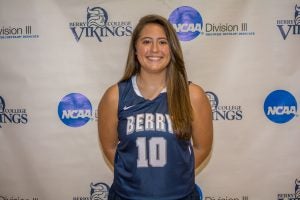
Photo courtesy Russell Maddrey and Berry Athletics
Marlee Smith was prepared to play college basketball at Berry before her injury. She’ll stay with the team and support from the sidelines.
Marlee said she didn’t know what to expect after she made her decision to stop playing.
She still went to basketball practices. Players would text her and ask her to come in and help with their shot or their footwork.
She told the story of one practice where the Berry starters were losing to a team of bench players in a scrimmage by about 20 points. During a timeout, Marlee joined the huddle.
“I told them they needed to pick it up, press, get up,” she said. “I just stood on one side of the floor and ran up and down it for the remainder of the scrimmage, trying to get them hyped and up and pressuring on defense. I think we lost by one. It was just ridiculous how fast the team turned around. The next couple of days (coach Dunn) said the upperclassmen were coming into her office saying things like, ‘Marlee did really awesome, we want her to stay on the team and be in that leadership position.’”
In early December, coach Dunn called Marlee into her office and asked if she wanted to take up a paid student coaching position next season.
Marlee said she’d think about it, but her mind was already set.
“I wanted to stick with the team for the rest of the four years, no matter if I got to play or not,” Marlee said. “So I called mom, called dad and they were all on board for it.
“Some doors were closed but God always opens up some more. It helped me a lot. That’s what I had to do again with this whole knee situation, just lean on him again. With my (first) ACL tear, I had to trust that he’d use my weakness. It has helped me a lot and I’ve had support from my family and friends.”
Spending less time in the gym has helped Marlee branch out and see more of what the towns of Berry and Rome in Georgia have to offer. She’s joined a program called Young Life, which does work in high schools in Rome. She can study abroad — something she wanted to do but was not feasible with basketball taking up most of her time.
“There’s just a lot of different stuff on campus at Berry that I just wasn’t opened up to yet because of basketball,” she said. “I was going into the gym two or three times a day, I was just focusing on basketball and studies, then I’d go to bed. Now that I’m getting to go out, see more, I’m joining more clubs, I’m playing intramural ball, meeting new people.”
Berry has given Smith the chance to be around the sport that she loves while opening new paths for her to walk.
“First, when I had officially told my coach that ‘I’m not playing; I’m not doing that to my knee,’ I thought, what am I going to do to fill my time?” Marlee said. “I figured I’d pick up another major — international studies and political science — with my French minor. That adds another couple classes in, which I’m really glad I can do that. I got to open up more doors with my studies.
“The door of basketball playing closed, but it’s opened a lot of big doors and small doors that I wouldn’t have paid attention to. The group of friends I have now, I knew them when I was playing basketball but I never got to talk to them as much. Now, those girls are the first people I see when I wake up, the first people I go to to help study. After this first semester, I know that we’re going to be friends all through summer.”
Staying positive
Despite an injury taking away something that she loves, Marlee has stayed positive — something that her parents admit they wouldn’t be able to do at her age.
“It never really hit home until I saw her go through it,” Lisa said. “It’s just a sickening feeling. At 16, when it first happened to her, I wouldn’t have responded the way that she did. I think that we felt more low than she did at times. But she taught us to not be that way. I told her, ‘I just want to be you when I grow up.’”
“It’s taught her things about the world in general,” Jimmy said. “It’s not always good. It’s how you come back from it, how you adjust to what you’ve been given. She’s done a whole lot better at it than I ever would have at such a young age. That’s such a young age to be doing something for the fun of it and it being cut away.”
Marlee said the prayers and support of friends and family helped her never get too low.
“Everyone has their low point, and I was disappointed the first time I heard it,” she said. “… I never really thought, ‘oh, poor pitiful me. I don’t get to play, this is it.’ I kind of just said, ‘you know what, life sucks; you just have to pick it up and go on with it.’ But I definitely think that I would have had lows if I didn’t have the friends and family that I do that prayed about it.”
Jimmy said he and his wife don’t tell their kids to focus on what happens or why. Instead, he wants them to focus on how they can use what they’ve been given.
“You don’t always know why things happen, and you can’t worry or dwell on why they happened,” he said. “You’ve got to figure out how to use that and move on. ‘OK, what is God teaching me here? How’s he going to use me to share his word, share his love, share a story about him with somebody?’”
Now, Marlee said she’s excited to see where her new paths might lead.
“At the end of the day, I think God gives everyone a platform,” she said. “Everyone has somewhere to speak and share their faith with others, lead each other to Christ. I thought sports was mine, and it still can be.
“I got to talk to so many people through FCA and stuff like that. I think that when I tore my ACL, I thought that was my platform. That’s why I didn’t want to harp on the bad that came from it and really focus on the good. I got to talk to our team, other teams about my situation and how it led me closer to God. Whether it’s through sports or through injury, if I can let one person see God through me and change their life for the better, it’s worth it to me.”
At the end of the day, Smith’s story has plenty of pages to fill.
Follow Matt Overing on Twitter @MOvering


